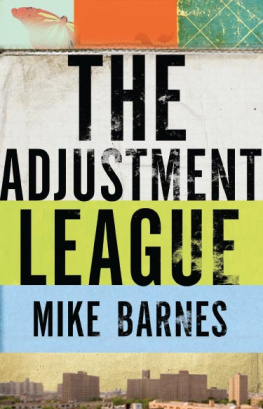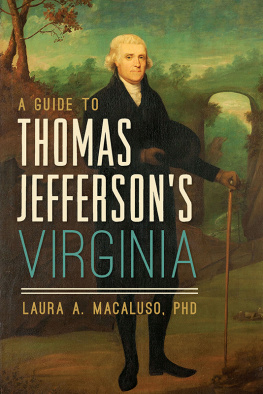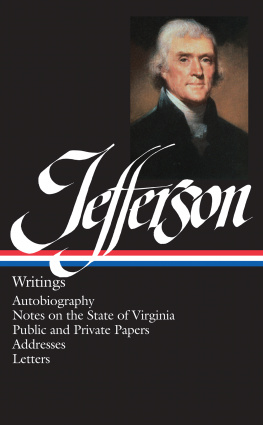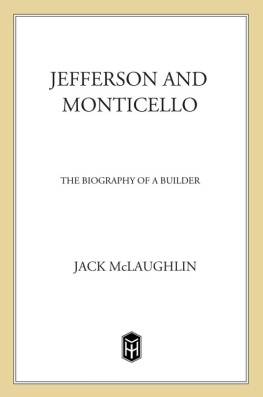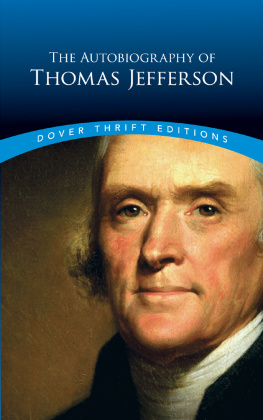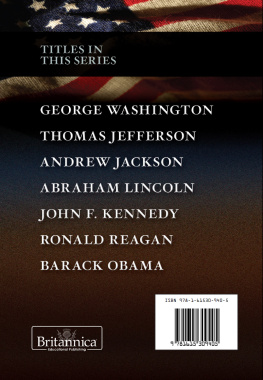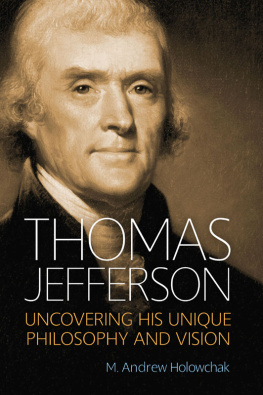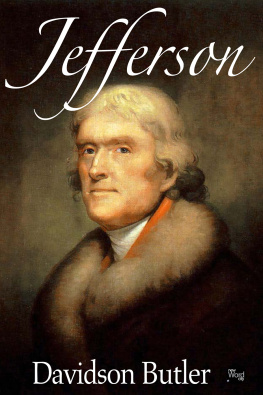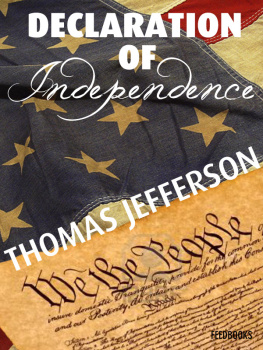NOTES ON THE STATE OF VIRGINIA
THOMAS JEFFERSON
Introduction by Peter S. Onuf

Introduction and Suggested Reading
2010 by Barnes & Noble, Inc.
This 2011 edition published by Barnes & Noble, Inc.
All rights reserved. No part of this publication may be reproduced, stored in a retrieval system, or transmitted, in any form or by any means, electronic, mechanical, photocopying, recording, or otherwise, without prior written permission from the publisher.
Barnes & Noble, Inc.
122 Fifth Avenue
New York, NY 10011
ISBN: 978-1-4114-3828-6
INTRODUCTION
T HOMAS J EFFERSON S ONLY BOOK , N OTES ON THE S TATE OF V IRGINIA , is a rich and revealing compendium of information and opinion on the largest and most important state in the union at the end of the American Revolution. Written in response to a set of Queries that French diplomat Franois Marbois circulated among leading men of the new American republics, Notes offers an illuminating portrait of the author as well as of his beloved Commonwealth. Jefferson was a Virginia patriot and his identification with his country was central to his self-understanding: the American Revolution was the epochal, transformative event in his personal history and in Virginias history. Presented in the scientific spirit of the Enlightenment as an encyclopedia of useful data, Notes is also an eloquent testament to Jeffersons faith in the redemptive potential of the republican revolution. Yet Jeffersons hopes are shadowed by his fearshis anxieties about the future, and the threat that forthcoming generations of Virginians will fail to fulfill Revolutionary Virginias promisewhich are never far below the surface. The resulting tension is reflected in Jeffersons prose. Notes on Virginia, Jeffersons only sustained and systematic effort to chart Virginias revolutionary transformation, illuminates the sources of his eloquence while offering some of his most memorable turns of phrase.
Born in 1743, Jefferson was still a young man when he drafted his first responses to Marbois in late 1781. Although he had already made important contributions to the Revolutionary cause, both in Congress as chief draftsman of the American Declaration of Independence and in Virginia as a reform-minded legislator, Jeffersons allegedly poor performance as war governor clouded his future prospects. Lacking the constitutional authority and political resources to mobilize effective defenses against the turncoat Benedict Arnolds invasion of the state in December 1780, Jefferson and the legislature fled from Richmond, the state capital, to Charlottesville; Banastre Tarletons follow-up assault on Charlottesville precipitated further flight, with the beleaguered ex-governor seeking refuge at his Poplar Forest plantation near Lynchburg while the legislature reconvened at Staunton, across the mountains. Despite the states woefully inadequate defenses, the British threat quickly subsided. Commander Charles Cornwallis walked into a Franco-American trap at Yorktown and his surrender (December 19, 1781) sapped Britains counter-revolutionary will to fight and pointed toward a peace settlement. Republican Virginia had nearly been wiped off the map and Jeffersons career had been tarnished, perhaps irredeemably, even though the Virginia Assembly resolved to obviate and remove all unmerited Censure. If the commonwealth had survived, neither Jefferson nor his fellow Virginianswith the glorious exceptions of Commander George Washington and his Continental troopsdeserved any credit for this happy outcome.
As Jefferson drafted his Notes and revised them over the next few years, Virginias prospects revived. Centrally located and with the largest territory and population of any state, Virginia was bound to take the leading role in the union that had secured its independence as a self-governing commonwealth. The forward-looking, boosterish thrust of many of Jeffersons Queries (or chapters) reflected his renewed confidence in a future that could be calculated and projected, in the characteristic mode of contemporaneous political economy, in terms of extensive territory, an expanding population, and boundless resources. But fundamental questions lingered for Jefferson about whether Virginians were sufficiently virtuous and patriotic to fulfill their states promise. Marbois questions led Jefferson to probe Virginias constitutional liabilities, both in the familiar modern sense of his concerns about the 1776 state constitution and in the broader sense of his concerns about possible defects in the constitution and character of the body politic.
Jeffersons authorial presence may not be immediately apparent in Notes on the State of Virginia, but it is nonetheless an extraordinarily personal document, written in a time of epochal changes in his world and in his private life. The malaise of 1781 was exacerbated in the next year by the devastating blow of the death of his wife, Martha Wayles Jefferson, and was only relieved by new public assignments, first as a Virginia delegate in the Confederation Congress (178384) and then as the new nations representative in Paris (178489). Notes was first published in 1785, in a private French edition intended for limited circulation, and only gained a broader readership in the first English (Stockdale) edition, published in London in 1787. Jefferson was reluctant to publish, but feared that bowdlerized, mistranslated versions of the original text would misrepresent him to the larger world; except for his famous state papers, written in his capacity as a public servant, Jefferson would avoid publication in the future. Jeffersons reluctance to publish Notes reflected his awareness that some of its passages, particularly on slavery and the Virginia constitution, would provoke controversy, revealing too much about his own private views and thus compromising his public persona. His self-consciousness was also apparent in his choice to include the map of Virginia drafted by his surveyor-father Peter Jefferson and Professor Joshua Fry of the College of William and Mary in 1751 as a frontispiece of the Stockdale edition. Philiopiety and patriotism merged as Jefferson simultaneously merged his own identity with his fathers and with Virginias.
Jefferson emphasized three major themes in ordering his responses to Marbois Queries. He began with a set of Queries (IVII) on Virginias physical geography that can be read as a sustained commentary on, and prose equivalent of, the Fry-Jefferson map, and then proceeded to a survey and analysis of the Commonwealths population in Queries VIIIXI and a discussion of its government, laws, manners, and public statistics in Queries XIIXXII. Notes concludes with a Query (23) on previous histories of Virginia (which Jefferson considered inadequate) and a catalogue of important state papers. Bracketed by a prospectus for Virginias future growth and by a compilation of resources for understanding its past, Jeffersons ambivalent analysis of contemporary Virginians and their capacity for fulfilling the American Revolutions promise constitutes the heart of his book.
Virginias prospects seemed boundless, if only Virginians would seize them. The Commonwealths territorial claims, not yet recognized by other states or by foreign powers when Jefferson began writing, were bounded on the north and west by the Ohio and Mississippi rivers, embracing a total of 121,525 square miles, a vast domain one third larger than the islands of Great Britain and Ireland (Query I). Rivers (Query II) would be key to the development of Virginias inland empire, particularly if the Potomac could be connected with the Mississippi River system. Nature favored Virginians, but it was incumbent on them to improve its advantages. This was the implicit message of Query VI, with its extensive inventories of mineral, vegetable, and animal resources. Refuting the claim of prominent European naturalists that animal species, including humans, degenerated in the New World, Jefferson assembled data that demonstrated that Americans were at least as big, probably bigger than their Old World counterparts. The new nation had already produced a cohort of geniuses (including George Washington, one of the most celebrated worthies of the world, scientist-statesman Benjamin Franklin, and the astronomer David Rittenhouse) who augured well for its human development. Yet even these patriotic polemics betrayed Jeffersons anxieties. Would succeeding generations live up to the Revolutionary generations high standard? Would Americans successfully exploit their natural advantages? Would Virginia extend its effective jurisdiction to the limits depicted and described by Peter Jefferson and his son Thomas?






